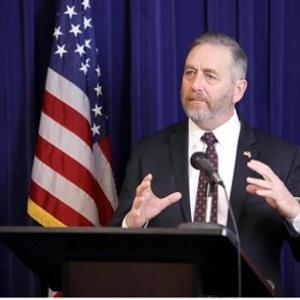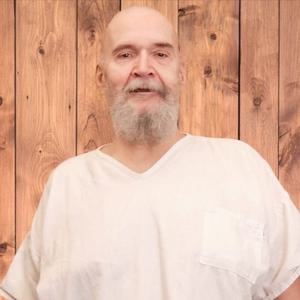
A federal district court judge has issued an order moving closer to trial a lawsuit filed against a Utah county for the alleged retaliatory firing of a lawyer who had publicly criticized the county for refusing to adequately fund his client’s death-penalty appeal.
In an opinion published September 30, 2020, Judge Howard C. Nielson, Jr. of the U.S. District Court for the District of Utah denied a motion filed by lawyers for Weber County, Utah to dismiss a lawsuit filed by Samuel Newton (pictured) that claimed the county had violated his First Amendment right to free speech for terminating a contract to provide appellate representation to indigent defendants in response to his efforts to obtain funding for interviewing and presenting witnesses and additional briefing during his representation of death-row prisoner Douglas Lovell.
The court flatly rejected Weber County’s argument that Newton was simply an “ordinary public employee” acting in the course of his official administrative duties when the county fired him for criticizing its alleged unwillingness to adequately fund Lovell’s appeals. A defense attorney “‘speaking on behalf of the client,’” Judge Nielson declared, “is emphatically ‘not the government’s speaker.’” The county, Nielson wrote, could not “terminate an attorney whom it has engaged to represent indigent criminal defendants based on his or her official communications without further First Amendment scrutiny.”
Judge Nielson also rejected the county’s contention that Newton’s speech was not protected by the First Amendment because it involved personal contractual matters, rather than matters of public concern. “To the contrary,” Judge Nielson wrote, “these communications implicated matters such as whether the County was underfunding the defense in a high-profile capital case, whether the County was seeking to limit Mr. Newton’s communications with his client, and whether the County was second guessing and undermining Mr. Newton’s ‘exercise of independent judgment on behalf of the client.’”
Although the court allowed Newton’s First Amendment claim against the county to move forward, it dismissed the portions of his complaint seeking damages against the county commissioners in their individual capacities, finding that they had qualified immunity against suit. Judge Nielsen also dismissed Newton’s claim that the commissioners and the county had engaged in a conspiracy to obstruct justice by “operat[ing] in concert to violate [his] rights.”
Before his appellate defense contract was cancelled by Weber County, Newton had a separate contract with the county to represent Douglas Lovell in the appeal of his 2015 death sentence. That contract provided for up to 500 hours of appellate services at a rate of $150 per hour. Based on evidence uncovered during Newton’s representation, the Utah Supreme Court remanded the case to the trial court for an evidentiary hearing on alleged investigative failures by Lovell’s trial lawyer and the possible interference by the Church of Latter-Day Saints with the testimony of bishops who had worked with Lovell in prison. Having reached the funding limit authorized in his initial agreement with the county, Newton asked for further funding in August 2017, estimating that it would take an additional 500 – 750 hours. The county said it would pay no more than $15,000, publicly accusing Newton of overbilling, unnecessarily interviewing witnesses the county claimed were irrelevant, and meeting too frequently with his client. The county refused to move off its $15,000 offer even after Newton reduced his request to an interim authorization of $37,500 for further work.
Newton then sought to withdraw from the case, citing the underfunding and the toll the dispute with the county was taking on his health. The county had placed him in a “terrible catch-22,” Newton said: either he could “represent Mr. Lovell zealously and lose his livelihood or compromise Mr. Lovell’s case and save his practice.”
After the court granted his request to be taken off the case, Newton continued speak out about Weber County’s failure to properly fund Lovell’s appeal. In October 2017, claiming that Newton had “made various representations to the media and to the court that have been untruthful and harmful to the county’s reputation,” the Weber County commissioners terminated Newton’s contract to provide indigent appeals services to the county in other cases two years before its scheduled expiration date.
The dispute over the funding of Lovell’s death-penalty appeal is an outgrowth of systemic issues in Utah’s provision of counsel in capital cases. The state has created a trust fund administered by the Utah Indigent Defense Commission to defray the costs of capital-defense representation. All but five Utah counties make an annual payment into the trust to ensure funding is available in the event of a capital prosecution in their county. However, Weber County — which has long been criticized for underfunding defense lawyers in death penalty cases — does not contribute to the fund, placing it on the financial hook for the entire cost of representation of indigent capital defendants at trial and on appeal.
Mark Shenefelt, Fired death penalty attorney wins key ruling in lawsuit against Weber County, Standard-Examiner, October 6, 2020; Jacob Scholl, Lawsuit against Weber County highlights larger issue in Utah court system, Standard-Examiner, February 9, 2018; McKenzie Romero, Death row inmate’s former lawyer suing Weber County, claims free speech rights violated, Desert News, February 5, 2018; Mark Shenefelt; Weber County alleges unethical misrepresentations by death penalty attorney in billing disputes, Standard-Examiner, June 19, 2019.
Read the federal district court’s ruling in Newton v. Weber County.
Utah
Jul 26, 2024


